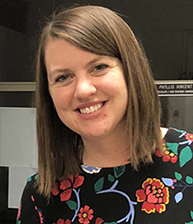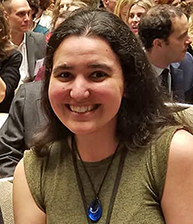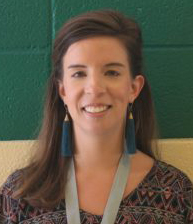
Whitney Williams is a teacher, but she calls herself a “facilitator of learning.”
“It is not my job to have all the answers, but it is my job to cultivate an environment for learning that inspires and encourages students to take risks and seek answers,” said Williams.
Williams calls that approach the most important lesson she learned at Carolina’s School of Education. Williams, who teaches second grade at Grady Brown Elementary School near Hillsborough, earned both her degrees at the School – a bachelor’s in education in 2012, followed by a Master’s in Education for Experienced Teachers in 2017.
“Professors in the School of Education led by example and modeled strategies that I truly believe helped me become a better teacher,” Williams said. “The instruction I received was grounded in research that challenged my thinking and teaching. I was given opportunities to see a variety of school settings and pedagogies in action, which helped me find my niche and define my own philosophy of education.”
The experience Williams had at Carolina is shared with others who have been through the School’s teacher-preparation programs.
A recent report prepared for the UNC System Office by the Education Policy Initiative at Carolina evaluated the effectiveness of Carolina teachers.
“The results show that UNC-Chapel Hill prepared effective teachers, especially in secondary STEM subject areas. These findings are also evident for economically disadvantaged and minority students, demonstrating the educator preparation program’s strong commitment to social justice in serving the marginalized and underserved population,” the report said.
What the data shows
The report examined student test scores on End-of-Grade exams for North Carolina teachers over five years, from the 2012-13 through 2016-17 academic years, to determine the effectiveness of teachers who graduated from UNC system universities.
The study calculated how many additional months of student learning achieved in teachers’ classrooms beyond an expected number of months of learning.
Among the findings, among overall student populations:
- In elementary math, students gained 1.26 additional months.
- In middle school math, students gained 1.73 additional months.
- In middle school science, students gained 2.4 additional months.
- In high school biology, students gained 2.2 additional months.
Larger gains, according to the report, were among students from economically disadvantaged and minority populations, and from struggling schools.
- In middle school science, among economically disadvantaged students, 3.3 additional months.
- In high school biology, among economically disadvantaged students, 2.4 additional months.
- In middle school math, among minority students, 1.26 additional months.
- In high school biology, among minority students, 2.3 additional months.
- In middle school science, within low-performing schools, 4 additional months.
Diana Lys, assistant dean for teacher preparation and accreditation at the School of Education, said the results reflected emphases that the School and its faculty place on preparing students for helping the neediest students.
“We see it as part of our mission to address educational inequities through relationship building and student engagement,” Lys said. “These data indicate that we are having success preparing our teacher-candidates to do just that.”
Preparation for meeting students where they are
Williams, who teaches at a school where 52 percent of the students come from low-income households, said her preparation at Carolina was fundamental to helping her continue to improve her work.
“My time at the School of Education taught me how to reflect, question, and challenge my own teaching, which I firmly believe helps me grow each day,” she said.
Jean Skelton graduated from the School of Education in 2016 and teaches at Sandy Ridge Elementary School in the Durham Public Schools system. At Sandy Ridge, 65 percent of students come from low-income households.
Skelton, who teaches third grade, said she learned at the School of Education many strategies that she uses every day.
“The instruction I received from UNC’s School of Education prepared me beautifully for being a “real” teacher in my own classroom,” Skelton said. “I was ready to be flexible – with my students, with parents, with coworkers, with timing, with instruction, with interventions, all of it.
“My job is to do my best to reach all of my students wherever they are academically, emotionally, socially, and the teaching that I received from the professors in the School of Education at Carolina placed the highest priority on just that.”

Preparation for the ‘real world’
Susan Meyer, the Latin and mythology teacher at Culbreth Middle School in Chapel Hill, won in January the Excellence in Precollegiate Teaching Award from the Society for Classical Studies, a national award for teachers of Latin.
Meyer, who completed the MAT program at the School of Education in 2010, said the School gave her important preparation that gave her a “realistic view” of the teaching profession.
“The School of Education gave me the training I needed to excel in the field,” Meyer said. “I’ve frequently used the material from our developmental psychology unit to better relate to my students and to remind myself to meet them where they’re at as an age group.”
Eliza Brinkley is in her first year of teaching, having completed the MAT program in 2018. She’s teaching English at Northwood High School in Pittsboro.
“My teacher preparation program was only one year in length, and yet in that one year, I grew more in my understanding of schools and in my confidence as an educator than I could have ever thought possible thanks to the variety and value of the experiences I was offered,” Brinkley said.

At the School of Education, Brinkley said she was able to explore evidence-based practices of other highly effective teachers, while also experimenting with those practices in her student teaching internship.
She said she continuously pushes herself to make her courses stimulating and interactive.
“Another practice that my professors emphasized was the importance of establishing and investing in relationships built on trust and respect with students,” Brinkley said. “Students bring a variety of cultural and intellectual assets with them to school, and it is the teacher’s job to recognize and utilize those assets in the classroom. I try to stay mindful of integrating students’ gifts, interests, and cultural identities into class time as much as I can.”